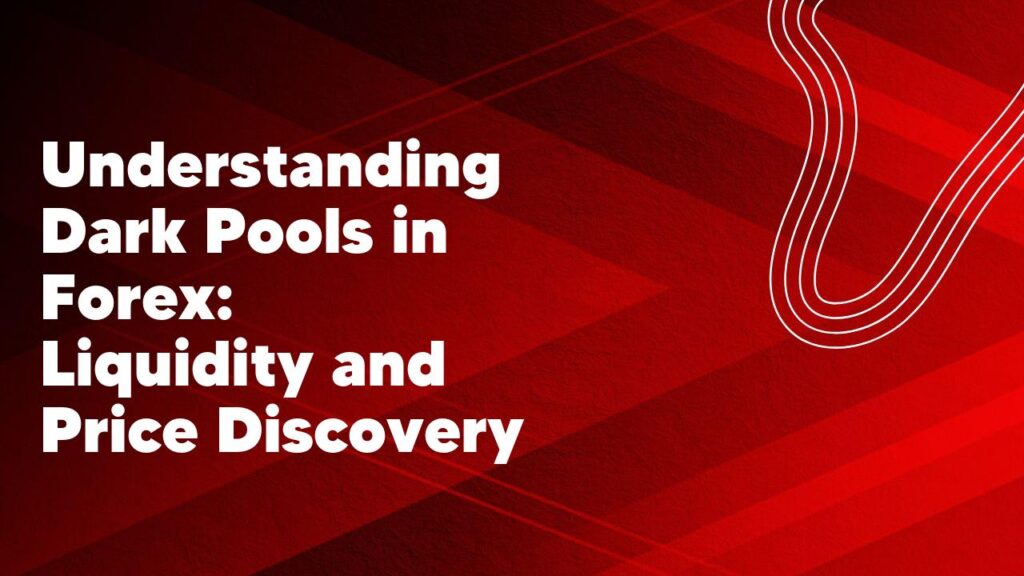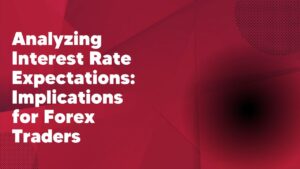Dark pools have become a significant feature of the forex market in recent years. These private trading venues offer opportunities for large institutional investors to execute large forex trades away from the public exchange markets. With the rise of dark pools, understanding their impact on liquidity and price discovery in the forex market has become crucial. Liquidity is a key aspect for any financial market as it ensures that traders can readily buy or sell assets at desired prices. However, the presence of dark pools has raised concerns about the potential adverse effects on market transparency and price efficiency. This paper aims to explore the dynamics of dark pools in the forex market, focusing on their impact on liquidity and price discovery. By understanding the role of dark pools, market participants can make more informed decisions and navigate the rapidly evolving forex landscape effectively.
What are Dark Pools in Forex?
Dark pools in Forex are private and anonymous trading platforms that allow institutional investors to execute large orders without revealing their intentions to the market. These off-exchange trading venues aim to provide liquidity and reduce market impact for participants who trade in large volumes. Dark pools operate by matching buy and sell orders internally, without publicly displaying the order book or price information. Participants in dark pools can access a pool of liquidity from other participants, which can include other institutional investors, banks, or high-frequency trading firms. By trading in dark pools, investors can minimize transaction costs and slippage, as well as reduce the risk of information leakage and market manipulation. However, there are concerns about the lack of transparency and how these private trading venues may impact price discovery and market efficiency. Regulators are closely monitoring the usage of dark pools in the Forex market to ensure fair and orderly trading.
Importance of Liquidity in Forex Trading
Liquidity is a crucial factor in the Forex trading industry. It refers to the ease with which a trader can buy or sell a currency pair without significantly affecting its price. In other words, liquidity ensures that there are enough buyers and sellers in the market to execute trades efficiently.
Having high liquidity in the Forex market is advantageous for several reasons. Firstly, it allows traders to enter and exit positions quickly, without experiencing significant slippage or delays. This is particularly beneficial in fast-moving markets where prices can change rapidly. Additionally, high liquidity levels ensure that traders can obtain competitive bid/ask spreads, reducing their overall trading costs.
From a risk management perspective, liquidity is crucial. It provides traders with the ability to effectively manage their positions and minimize potential losses. In illiquid markets, traders may struggle to find counterparties for their trades, which can lead to wider spreads and increased volatility.
Furthermore, liquidity is often a reflection of market sentiment and confidence. Highly liquid markets indicate that there is substantial investor activity and participation, suggesting a more stable and reliable trading environment. Conversely, low liquidity levels can indicate reduced market interest, making it challenging for traders to execute trades efficiently.
In conclusion, liquidity plays a pivotal role in Forex trading. It affects execution speed, trading costs, risk management, and overall market stability. Traders must consider liquidity factors when formulating trading strategies and choosing currency pairs to trade.
Exploring Price Discovery in Dark Pools
Dark pools, also known as Alternative Trading Systems (ATS), have become a popular phenomenon in the Forex market. These private platforms allow institutional investors to trade large blocks of shares without revealing their intentions to the broader market. As a result, dark pools provide a certain level of anonymity and reduce the impact of trades on the market. However, their opacity has raised concerns regarding price discovery. Price discovery refers to the process of determining the fair value of an asset based on supply and demand dynamics. In dark pools, where trades are not publicly visible, the information about these transactions is not readily available to all market participants. This lack of transparency can result in distorted price signals and hinder market efficiency. Regulators are increasingly scrutinizing dark pools and implementing measures to enhance transparency and oversight in order to mitigate the potential risks associated with price discovery in these private trading venues. Overall, understanding and analyzing price discovery mechanisms in dark pools is crucial for Forex traders and investors to make well-informed decisions and navigate the complexities of this market effectively.
Advantages of Dark Pools in Forex
Dark pools have become increasingly popular in the Forex industry, providing several advantages for traders. Firstly, dark pools offer increased liquidity, allowing traders to access a larger pool of potential buyers and sellers. This can result in improved execution prices and reduced slippage, enhancing overall trading performance. Additionally, dark pools provide an added layer of confidentiality, as trades are not displayed on public order books, minimizing the impact of large orders and reducing market manipulation risks. This can be particularly beneficial for traders looking to execute large orders without causing significant price movement. Furthermore, dark pools enable traders to access alternative trading strategies, such as iceberg orders and block trades, which may not be available on traditional platforms. This additional flexibility can help traders achieve their specific trading objectives more effectively. Lastly, dark pools can contribute to increased market efficiency by reducing the information asymmetry between market participants. This can lead to fairer prices and a more level playing field for all traders. Overall, the advantages of dark pools in the Forex industry make them a valuable tool for traders looking to enhance their trading experience and improve their overall profitability.
Challenges and Risks of Dark Pools
Dark pools, also known as alternative trading systems, are private platforms that allow investors to trade large blocks of securities anonymously. While dark pools offer advantages such as reduced market impact and price improvement, they also come with their fair share of challenges and risks. One of the key challenges is the lack of transparency, as dark pool trading activity is not publicly disclosed like traditional exchanges. This opacity can lead to concerns about price manipulation and insider trading, as participants may exploit the anonymity to execute trades based on non-public information. Additionally, the fragmented nature of dark pools can make it difficult for investors to accurately assess the true market price, potentially resulting in inferior trade executions. Moreover, the limited regulatory oversight of dark pools raises concerns about investor protection and market stability. Finally, the rapid evolution of trading technologies and algorithms introduces the risk of system failures or glitches, which can disrupt dark pool operations and lead to significant financial losses. In conclusion, while dark pools offer certain benefits, market participants must carefully weigh the challenges and risks associated with these platforms before engaging in trading activities.
Regulatory Framework for Dark Pools
Dark pools are private trading venues that allow large institutional investors to trade large blocks of shares anonymously, away from the public markets. While they offer benefits such as reduced market impact and increased privacy, they also raise concerns over market transparency and issues of fair pricing. In order to address these concerns, regulatory bodies have implemented a framework for the operation of dark pools. This framework includes rules and guidelines that aim to ensure fair and orderly trading and promote market integrity. It involves requirements for dark pools to disclose information about their operation, including details on how orders are matched and executed, as well as providing regular reports on their trading activities. In addition, regulators have implemented measures to prevent abuses such as front-running and market manipulation within dark pools. These measures include imposing strict reporting requirements and surveillance systems to detect and prevent any misconduct. With a robust regulatory framework in place, dark pools can continue to offer institutional investors the benefits of liquidity and reduced market impact, while also addressing concerns over market transparency and fairness. However, it is important for regulators to continually monitor and adapt their regulations to keep up with the evolving nature of dark pool trading and ensure that the framework remains effective in maintaining market integrity.
Impact of Dark Pools on Forex Markets
Dark pools have become increasingly popular in the Forex industry and have had a significant impact on Forex markets. Dark pools are private electronic trading platforms where large institutional investors can trade without revealing their trading intentions to the broader market. This anonymity allows for larger trades to be executed without causing significant price movement, which can be detrimental to traders looking to enter or exit positions. By trading in dark pools, institutional investors are able to minimize market impact and reduce transaction costs. However, the increased use of dark pools has raised concerns about market transparency and fairness. Critics argue that dark pools can contribute to price distortions and create a two-tiered market, where retail traders are at a disadvantage. Regulators have taken steps to address these concerns by implementing stricter rules and regulations surrounding dark pool activity. Overall, the impact of dark pools on Forex markets is a complex issue, with both benefits and potential drawbacks. Traders and investors must carefully consider the implications of dark pool trading and stay informed about regulatory developments to make informed decisions in the Forex market.
Strategies for Trading in Dark Pools
Dark pools are private trading platforms where large institutional investors, such as hedge funds and investment banks, trade large blocks of stocks away from public exchanges. Trading in dark pools can offer advantages such as lower transaction costs and reduced market impact. However, it also comes with its own set of challenges and risks. One strategy for trading in dark pools is the volume-weighted average price (VWAP) strategy. Traders can use VWAP to execute their orders over a specific period, ensuring that their trades are not detected and manipulated by other market participants. Another strategy is the implementation shortfall strategy, where traders aim to minimize the difference between the initial benchmark price and the final execution price. By carefully timing their trades and taking into account market liquidity, traders can optimize their trading performance in dark pools. Additionally, using sophisticated trading algorithms and smart order routing systems can help traders identify liquidity and execute trades at the best possible prices. Finally, it is important for traders to continually monitor and adapt their strategies to changing market conditions, as dark pool dynamics can vary significantly. By staying informed and being flexible, traders can successfully navigate the challenges and opportunities of trading in dark pools.
Conclusion
In conclusion, dark pools play a significant role in the forex market as they provide a hidden liquidity pool for large institutional investors. They offer several advantages, including reduced market impact and enhanced privacy. However, they also raise concerns about transparency and fairness, as the lack of information about trades conducted in dark pools can impact price discovery.
Dark pools enable institutional investors to execute large trades without affecting market prices significantly. This is particularly beneficial for institutions that handle large volumes of transactions, as they can minimize the impact on the market and achieve better execution prices. Additionally, dark pools offer enhanced privacy, allowing investors to execute trades without revealing their intentions to the broader market.
Despite these advantages, dark pools also raise concerns about transparency and fairness in the forex market. As dark pool trades are not immediately visible to the broader market, they may distort price discovery and hinder the efficient functioning of the forex market. This lack of transparency can lead to information asymmetry and potentially disadvantage other market participants.
In summary, while dark pools provide liquidity and privacy benefits to institutional investors, their impact on price discovery and market transparency should be carefully considered. Regulators and market participants need to strike a balance between promoting efficiency and protecting market integrity when it comes to the use of dark pools in forex trading.
1. What are dark pools in forex?
Dark pools refer to private trading platforms where institutional investors can execute large orders discreetly, without revealing their intentions to the wider market.
2. How do dark pools provide liquidity?
Dark pools contribute to liquidity by allowing institutional traders to match their buy and sell orders within the platform, enabling them to execute large trades without impacting market prices.
3. What are the advantages of using dark pools?
Some advantages of utilizing dark pools include reduced price impact, enhanced privacy and anonymity, and mitigating the risks associated with high-frequency trading.
4. Are dark pools regulated?
Yes, dark pools are subject to regulation and oversight from financial authorities to ensure fair and transparent trading practices.
5. How do dark pools affect price discovery?
Dark pools can impact price discovery as large trades executed within these platforms are not immediately reflected in public market prices, leading to potential distortions in price signals.
6. Are individual retail traders allowed to access dark pools?
No, dark pools are primarily restricted to institutional investors due to their large order sizes and the need for confidentiality.


